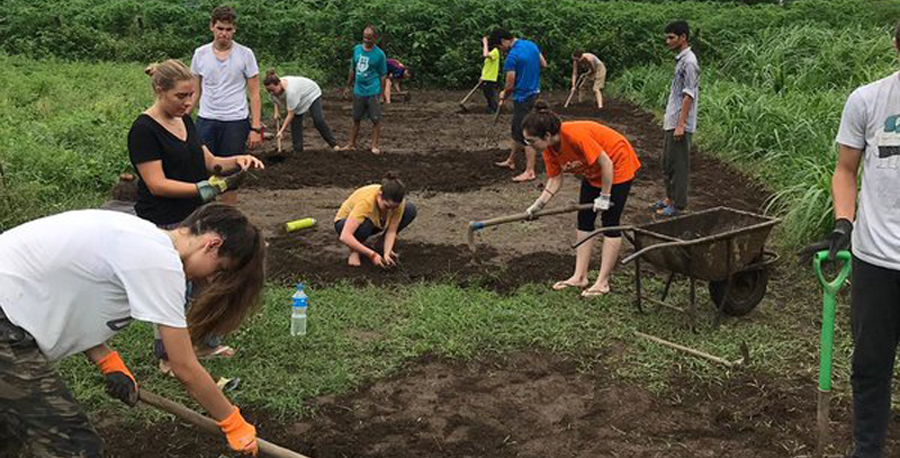Volunteer in Organic Farm of Rural Areas

Do you want to help make the world a better place? Are you ready to get your hands dirty and plant vegetables that will help fight back the poverty of the locals? How about traveling to the beautiful country of Nepal to make it happen? Join NVCYE-P Volunteer’s extremely organic farming volunteer program in Nepal to get started today!
Volunteer opportunities are available for individuals taking a break from their studies or careers at organic agriculture farms. These volunteers can gain valuable insight into the farming techniques utilized by rural farmers, while also sharing their own knowledge of agriculture. This volunteer work is especially suitable for those studying or training in fields such as agricultural management, entomology, disease control, organic farming, marketing, farming techniques, irrigation, and plant nutrition. It’s worth noting that over 80% of Nepal’s population relies on agriculture as their primary source of income. Nepal’s diverse climate supports the growth of a variety of crops and vegetables throughout the year, from the lower elevation regions (57m) to the high mountainous areas.
By participating in an agricultural volunteer program, you’ll have the opportunity to live with a local host family of farmers, learn about their age-old agricultural practices, and engage in agricultural work. Nepali agriculture has a unique cultural aspect, with farming practices being viewed as a celebration and cultural tradition. Nepal celebrates several agriculture-related festivals, including the Hile Jatra (paddy plantation ceremony) and the Daai festival (paddy harvest ceremony). Animism, which is still prevalent among farmers, includes nature worship and agricultural worship.
Through the agricultural volunteer program, you can learn different traditional techniques, such as making Gundruk, weaving gundri mats from straw, producing blankets from wool, churning curd to make ghee, milking animals in the traditional way, and enjoying tree-ripened fruits. By learning from Nepali locals, you’ll gain insight into their ideas and techniques, which you can apply when you return to your home country and grow plants in the Nepali way. Additionally, ploughing fields using oxen can be a fun experience. These small experiences can be transformative, helping you become wiser and more knowledgeable about local practices wherever you go.
Volunteer Responsibilities
- Field work activities: digging, seed planting, watering fields
- Tomato tunnel maintenance: watering every other day
- Wheat harvest in April
- Assisting with construction of new house in typical Nepali hill style
- Additional activities: hiking, yoga and meditation, making khuwa, shopping at market, staying overnight at Bethanchowk
- Learning fundamentals of Shittake mushroom farming
- Assisting with raising broiler and kadaknath chickens
- Afternoon activities: harvesting, crop growth, hiking, making khuwa, or other necessary field work.
Skills and Qualifications
This volunteer program does not require volunteers to have any specific education or experience. However, you should be in good physical shape and genuinely enjoy working in the field and staying with the locals. Additionally, you should be kind, patient and flexible and possess a passion for improving the lives of those less fortunate than you.
Accommodation-Room/Food/Supervision
Without visiting your host country ahead of time, it can be hard to know which accommodations are in safe and secure locations and what food sources are healthy and hygienic. You might be worried about feeling lost, stranded, or on your own in a place you have never been to and might not even speak the language.
ICYE Nepal takes care of all these things for you throughout the entire duration of your time in volunteering in Nepal, so you can rest easy and know that everything is in order before you arrive. We have carefully vetted every single aspect of your trip, selecting safe and comfortable accommodations, arranging healthy and nourishing local meals, and ensuring that you have helpful and experienced local staff on the ground to guide and support you every step of the way.
Volunteers will stay in a host-family. The host families have a strong interest in our volunteers’ safety and well-being, and they demonstrate this with caution and care. In most host family situations, you will share a room with another volunteer of the same gender.
Lunch & dinner is provided by the host-family during your volunteer work in Nepal. Food is prepared in local style. The main types of food will be rice, lentil soup and vegetables, but once a week the hostel will provide you meat in your lunch or dinner. For vegetarians the choice is usually limited to rice, vegetables, lentil soup and pickle.
Apply Now